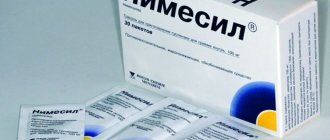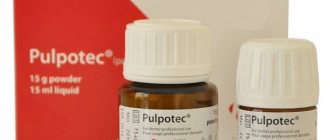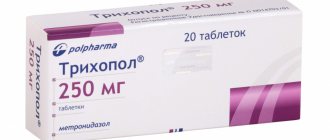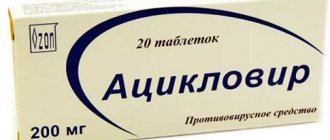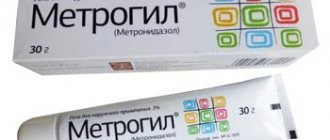Pain syndrome in cats can occur unexpectedly and severely. The first aid in this case can be the drug "Nimesil". If it is not possible to quickly deliver the animal to a veterinary clinic, the medicine will provide temporary pain relief and ease the suffering of your furry pet. "Nimesil" has a long-lasting effect.
Treating cats with NSAIDs, including human ones, is allowed only in extreme cases. When taking Nimesil for 2-3 days, your pet may develop an ulcer.
Compound similarities
These drugs have the same release form - water-soluble powder. Their therapeutic effects are similar. Both drugs effectively reduce temperature and eliminate pain.
Nemulex contains the active substance – nimesulide.
Additional components:
- macrogol;
- sucrose;
- flavoring agents;
- citric acid;
- silicon.
The medicine has analgesic, anti-inflammatory, antipyretic, and antiaggregation properties. The product has good digestibility. The medicine remains at its highest concentration in the blood for 2.5 hours.
The drug quickly enters the lesion and is excreted by the liver and kidneys. Nemulex suppresses prostaglandins in the inflammatory focus. The medicine is used to treat negative symptoms. The medication eliminates pain and prevents the development of inflammation.
Indications for use:
- arthritis;
- muscle pain;
- joint pain;
- bursitis;
- tenosynovitis;
- pain during menstruation;
- headache;
- toothache;
- pain syndrome during the development of intervertebral hernia;
- pain after injuries and operations.
The product does not have a therapeutic effect, but eliminates pain and inflammation of an episodic nature.
Indications for use of Nemulex: arthritis, muscle pain, joint pain.
Nimesil is produced in the form of granules for oral administration and suspension. The active substance is the same - nimesulide.
Additional components:
- macrogol;
- maltodextrin;
- lemon acid;
- sucrose;
- flavorings.
The medicine is a non-hormonal anti-inflammatory drug. It has anti-inflammatory, antipyretic and analgesic properties.
The drug reduces the synthesis of prostaglandins by inhibiting cyclooxygenase. After oral administration, the drug is well absorbed, reaching its highest concentration in the blood after 2-3 hours. The drug is metabolized in the liver.
Indications for use:
- elimination of pain syndrome;
- relief from primary dysmenorrhea.
Kinds
A veterinarian should prescribe pain medication for your cat. Only a specialist can assess the need for analgesic therapy and select the type, brand and dosage of the medication. When prescribing, the biometric characteristics of the pet (weight, age, gender), its health and physiological condition must be taken into account.
In cat veterinary medicine, a limited list of drugs is used.
Most analgesics used to treat humans, dogs, and large pets are toxic to cats.
Types of drugs used in cats:
- Opioids. Narcotic drugs.
- Non-steroidal anti-inflammatory drugs.
- Local anesthetics.
- Alpha2-adrenergic agonists (alpha2-adrenergic receptor agonists).
- NMDA receptor antagonists.
- Anticonvulsants.
Differences between Nimesil and Nemulex
Despite the fact that these drugs are analogues, they also have differences.
Main differences:
- the price of Nemulex is less than Nimesil;
- they are made by various manufacturers;
- the taste and smell of the powder differs;
- Nemulex granules are larger than Nimesil;
- Nemulex in powder form often takes longer to dissolve in water.
But these differences are not significant; they do not affect the effectiveness of the drugs. Thus, apart from the price and slight differences in the composition of the components, these drugs do not differ in anything else. Both medications effectively eliminate pain and alleviate the patient's condition.
These medications should not be taken together, because they both contain the active ingredient nimesulide, and if taken at the same time, there may be an overdose that will cause side effects.
Both drugs have the same indications for use:
- osteoarthritis;
- arthritis;
- myalgia;
- arthralgia;
- headache and toothache.
Contraindications
Nemulex and Nimesil have the following contraindications:
- intolerance to the components of the drug;
- bronchospasm;
- alcoholism;
- gastrointestinal bleeding;
- stomach and duodenal ulcers;
- cerebrovascular bleeding;
- increased bleeding;
- bleeding disorders;
- severe heart failure;
- liver and kidney dysfunction;
- flu;
- high body temperature;
- children under 12 years of age;
- pregnancy in the third trimester;
- lactation;
- hyperkalemia;
- if the patient has undergone coronary artery bypass surgery;
- diabetes.
Nimesil has the following contraindications: intolerance to the components of the drug, bronchospasm.
These drugs should not be used simultaneously with antiplatelet agents, glucocorticosteroids and anticoagulants.
Instructions for use NIMESIL
Undesirable side effects can be minimized by using the lowest effective dose for the shortest duration necessary to control disease symptoms, as well as gastrointestinal and cardiovascular risks, below).
If there is no improvement in symptoms, drug therapy should be discontinued.
Rare cases of serious liver reactions, including very rare cases of death, have been reported associated with the use of nimesulide-containing medicinal products. Patients who experience symptoms similar to those of liver damage during treatment with Nimesil® (for example, anorexia, nausea, vomiting, abdominal pain, fatigue, dark urine) or patients whose laboratory tests of liver function deviate from normal values, should discontinue treatment with the drug. Repeated administration of nimesulide is contraindicated in such patients. Liver damage, most reversible, has been reported after short-term exposure to the drug.
During treatment with Nimesil®, the patient should refrain from taking other analgesics. The concomitant use of Nimesil® and other NSAIDs, including selective cyclooxygenase-2 inhibitors, should be avoided.
Patients receiving nimesulide who develop flu-like or cold-like symptoms should discontinue treatment with the drug.
Elderly patients:
Elderly patients have an increased incidence of adverse reactions to non-steroidal anti-inflammatory drugs, especially the incidence of gastrointestinal bleeding and perforation, which can be fatal to the patient.
Gastrointestinal bleeding, ulcer and ulcer perforation:
Gastrointestinal bleeding, ulceration and ulcer perforation may be life-threatening if the patient's medical history shows similar problems occurring when taking any non-steroidal anti-inflammatory drugs during treatment (regardless of the elapsed time), with or without the presence of dangerous symptoms, or the presence of history of serious gastrointestinal disorders.
The risk of gastrointestinal bleeding, ulceration, or perforation of an ulcer increases with increasing doses of nonsteroidal anti-inflammatory drugs, in patients with a history of ulcers, especially those complicated by hemorrhage or perforation, and in elderly patients. For these patients, treatment should be started with the lowest possible dose. For these patients, as well as patients taking concomitant low-dose aspirin or other drugs that increase the risk of gastrointestinal disease, combination therapy with protective agents (eg, misoprostol or proton pump inhibitors) should be considered.
Patients with gastrointestinal toxicity, especially the elderly, should report any unusual gastrointestinal symptoms (especially gastrointestinal bleeding). This is especially important in the initial stages of treatment. Patients taking concomitant medications that may increase the risk of ulceration or bleeding, such as oral corticosteroids, anticoagulants such as warfarin, selective serotonin reuptake inhibitors, or antiplatelet agents such as aspirin, should be advised to use the drug with caution.
If gastrointestinal bleeding or ulcers occur in patients receiving Nimesil®, treatment with the drug should be discontinued.
NSAIDs should be prescribed with caution to patients with a history of gastrointestinal diseases (ulcerative colitis, Crohn's disease), since exacerbation of these diseases is possible.
Disorders of the cardiovascular and cerebrovascular systems:
Patients with arterial hypertension and/or a history of mild/moderate acute heart failure, as well as patients with fluid retention and edema as a reaction to the use of NSAID therapy, require appropriate monitoring of their condition and consultation with a physician.
Clinical studies and epidemiological data suggest that some nonsteroidal anti-inflammatory drugs, especially at high doses and when used for long periods of time, may lead to a small risk of arterial thrombotic events (eg, myocardial infarction or stroke). There is insufficient data to exclude the risk of such events when using nimesulide.
In patients with uncontrolled hypertension, acute heart failure, established coronary artery disease, peripheral arterial disease and/or cerebrovascular disease, nimesulide should be prescribed after careful evaluation. An equally careful consideration of the condition should be performed before initiating long-term treatment in patients with risk factors for cardiovascular disease (eg, hypertension, hyperlipidemia, diabetes mellitus, smoking).
In patients with renal or heart failure, Nimesil® should be used with caution, as the drug may worsen renal function. If the condition worsens, treatment should be discontinued.
Elderly patients are particularly susceptible to adverse reactions to NSAIDs, including gastrointestinal bleeding and perforation, and deterioration of renal, hepatic, and cardiac function. Therefore, appropriate clinical monitoring is advisable.
Since nimesulide can affect platelet function, it should be prescribed with caution to patients with bleeding diathesis. However, Nimesil® does not replace acetylsalicylic acid in the prevention of cardiovascular diseases.
There are very rare reports of serious skin reactions to non-steroidal anti-inflammatory drugs, some of which can be fatal. Including exfoliative dermatitis, Stevens-Johnson syndrome, and toxic epidermal necrolysis. Patients are at very high risk of such reactions if, with a previously prescribed course of treatment, the onset of the reaction in most cases occurred during the first month of treatment. Nimesil® should be discontinued at the first signs of a skin rash, damage to the mucous membranes and other signs of an allergic reaction.
Nimesil® contains sucrose. This drug should not be prescribed to patients with rare hereditary problems of fructose intolerance, glucose-galactose malabsorption, or sucrase-isomaltase deficiency.
Impact on the ability to drive vehicles and operate machinery
Studies on the effects of nimesulide-containing drugs on the ability to drive vehicles and operate machines and mechanisms have not been conducted. Despite this, patients experiencing headache, dizziness or drowsiness after taking Nimesil® should not drive a vehicle, machinery or machinery.
How to take Nimesil and Nemulex
Nemulex is taken as follows. It is necessary to dissolve the contents of the package in 0.5 cups of boiled water. For adult patients and children over 14 years of age, take 100 mg 2 times a day. The medicine is taken after meals. The course of treatment should last no more than two weeks.
Nimesil is taken in a short course. The product is drunk after meals. The course of treatment should not last more than 14 days. For adults, 100 ml of the active substance (1 sachet of powder) is prescribed 2 times a day. Children and the elderly are prescribed the same dosages. Before taking the medicine, you need to pour the contents of the sachet into a glass of water, dissolve and drink the product.
Side effects of drugs Nimesil and Nemulex
Side effects of Nemulex are:
- nausea;
- vomit;
- sleep disorders;
- increased blood pressure;
- dyspnea;
- stomach bleeding;
- depression.
Side effects of Nimesil:
- nausea;
- vomit;
- pain in the epigastrium;
- sleep disorders;
- gastrointestinal bleeding;
- arterial hypertension;
- acute renal failure;
- breathing problems;
- anaphylaxis.
Adverse reactions
Taking the drug may cause side effects such as diarrhea or constipation, which disappear when you stop using the drug.
It is necessary to distinguish between the side effects of the drug and the complications caused by it. In option 1, the disorders go away on their own when you stop taking the medication, but complications require medical intervention. Adverse reactions from the gastrointestinal tract, such as nausea, vomiting, bloating, constipation or diarrhea, and black stools, are more common. Therefore, if you decide to give your pet Nimesil, mandatory monitoring of the animal’s condition and behavior is required.
Reviews from doctors
Svetlana Anatolyevna, therapist
These drugs are prescribed when the patient urgently needs relief from pain. Medicines effectively eliminate headaches, toothaches, and pain during menstruation. Patients tolerate these medications well, but they cannot be taken for a long time. The course of treatment should not last more than two weeks.
Arkady Mikhailovich, rheumatologist
In patients with rheumatoid arthritis, when the disease worsens, joint pain intensifies and the inflammatory process worsens, these drugs are prescribed. They effectively cope with pain and inflammation.
In what cases is it used?
Nimesil is used to eliminate pain in a pet as a result of severe injuries.
The medication is widely used to treat inflammatory processes of the musculoskeletal system, for urological and gynecological problems, in traumatology, and for fever of various etiologies. Veterinarians use Nimesil for cats in case of severe injuries, increased body temperature of animals, dental, postoperative and other types of pain.
Patient reviews
Alla, 35 years old
If pulpitis occurs, the doctor recommended taking Nimesil. He quickly eliminated severe toothache. The next day, when the severe pain had already disappeared, I went to see a dentist to treat a bad tooth.
Sergey Ivanovich, 60 years old
I have been suffering from osteoarthritis of the knee joints for several years. When the disease worsens, severe pain occurs and it becomes impossible to walk. In this case, the doctor advised taking Nemulex. I take the drug according to the instructions prescribed by the doctor. After a few days, the pain subsides.
Traditional and alternative methods
When your pet is in severe pain, you shouldn’t experiment and use folk methods one after another at home - maybe it will help!
The best solution is to immediately take the cat to the clinic or invite a veterinarian to your home, who will prescribe pain medication for the cat.
The only thing that can be recommended is to give the animal a soothing herbal decoction of chamomile, caraway and lemon balm. It will not relieve the pain, but it will help relieve the excitement caused by the pain syndrome.
To relieve your cat's suffering, there are alternative ways to relieve pain:
- Homeopathic remedies – Traumatin, Traumeel. Herbal medicines are not able to stop an acute attack. They are prescribed long-term therapeutic courses. Most often before and after spay/neuter surgery to speed healing and reduce pain effects.
- Manual therapy - massage. The procedure improves blood supply to tissues, relieves swelling and muscle spasms. This relieves pain from injury.
- Compresses, heating pads, IR irradiators. Used in the treatment of chronic non-inflammatory pain. Relieves swelling.
- Acupuncture - acupuncture. Relieves mild to moderate pain in chronic pathologies.
- Magnetotherapy. An effective way to eliminate swelling, pain, and inflammatory processes.
Before helping your cat cope with pain, determine the cause. Careless help can harm your pet.

